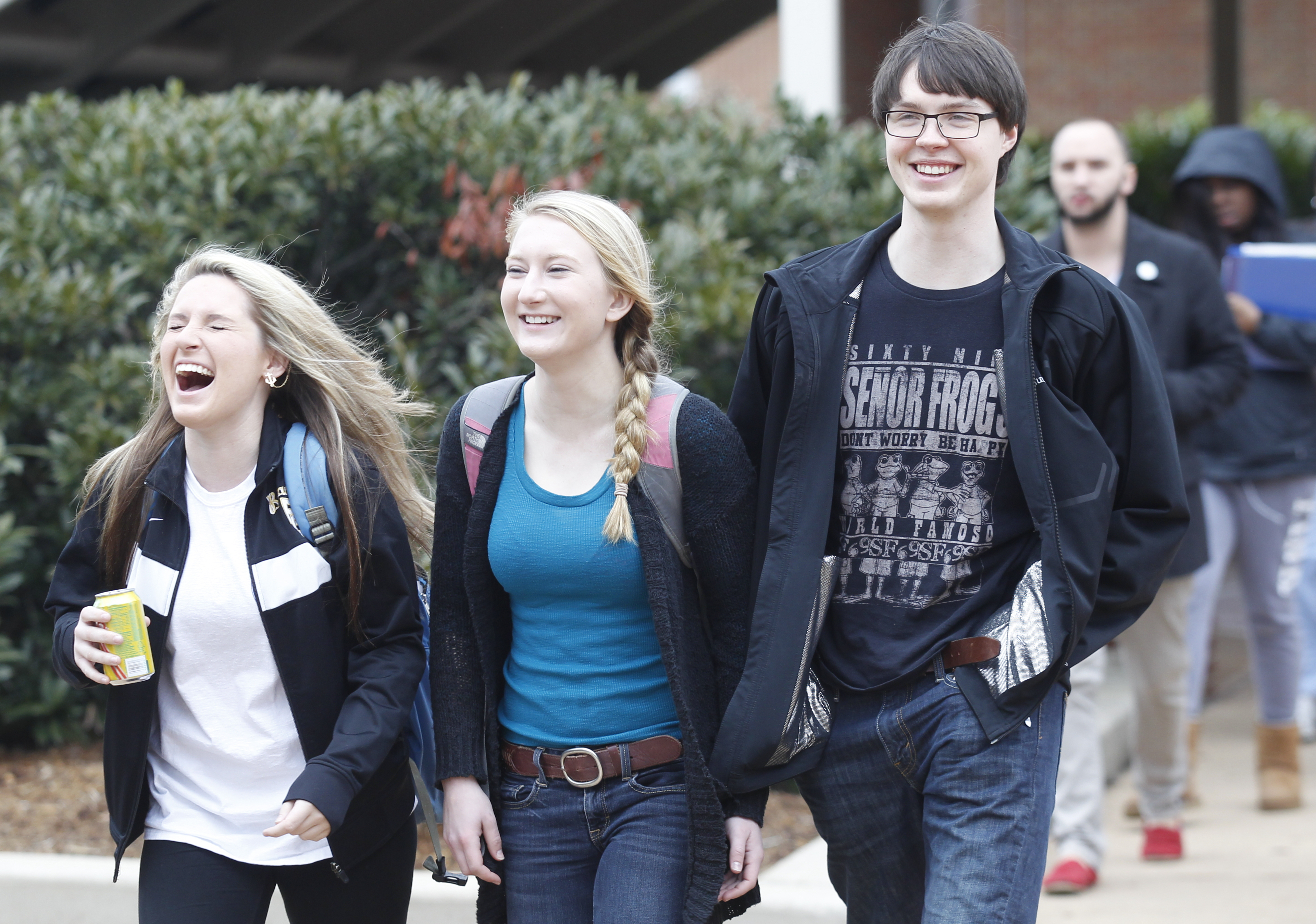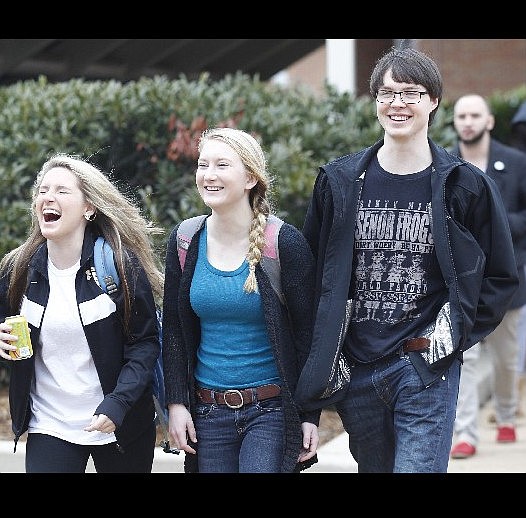 Collegiate High juniors Celeste Greene, Shannon Mooney, and Lucas Triplett, from left, walk to class Wednesday at Chattanooga State Technical Community College. The Collegiate High program offers high school students the opportunity to get both high school and college credit and even to graduate from high school and obtain a college associates' degree together.
Collegiate High juniors Celeste Greene, Shannon Mooney, and Lucas Triplett, from left, walk to class Wednesday at Chattanooga State Technical Community College. The Collegiate High program offers high school students the opportunity to get both high school and college credit and even to graduate from high school and obtain a college associates' degree together.AT A GLANCEWhat: Hamilton County Collegiate High at ChattState, a dual-credit high school at Chattanooga StateOpened: 2001Students: 115Average ACT score: 24.1Minimum ACT score: 19More information: www.chattanoogastate.edu/high-school/collegiate-high/
Don't let the name confuse you. Collegiate High School is exactly what it sounds like: a high school where students take college classes alongside college students.
In fact, it's a new name that was chosen for its simplicity by students of the on-campus dual-credit program at Chattanooga State that is known for its academic credentials.
Collegiate High students boast a 24.1 ACT average. That's the best among all Hamilton County public high schools, where the average is 19.7. One recent graduate landed at Stanford University, and Principal Sonja Rich says students are gaining acceptance to prestigious four-year schools all over.
"I think it's evolved now into being an honors school and an honors program," Rich said of the program that started in 2001 as a social alternative to the traditional high school environment.
There are other programs in the area that allow high school students to earn college credit. But none goes to the lengths of Collegiate High, which puts high schoolers on a college campus full time.
Now the school is expanding on its decade-plus of experience to offer a similar launching pad for more area students. Collegiate High will be open to freshmen for the first time this fall as part of an initiative to grow enrollment from 115 to 400.
This is not your typical high school with dances or football games, but officials say the social niche is growing. But that's not all. Research from the Early College High School Initiative shows that 77 percent of graduates from early college programs nationwide continue into some form of post-secondary education.
Jillian Brock is an example of a typical student at Collegiate High. She was home schooled, as roughly a third of those in the program were, and came to Collegiate High her junior year.
Brock, now a senior, will graduate in May with her associate's degree and plans to study education at UT-Chattanooga.
"I love it," Brock said of Collegiate High. "I did not like home schooling and I love it here."
How it works
For admission, students in grades 10-12 need a score of 19 or better on the ACT while the first class of 30-35 freshmen in the fall will need a 19 or better on the Explore test, a pre-ACT exam.
Catching students as freshmen, before they transition to another area high school, will maximize the number of college credit hours they can obtain.
"What's going to happen now is that they'll all pretty much go on to get an associate's degree if they start as a freshman," said Chattanooga State President James Catanzaro, the visionary behind the program.
Through the Hamilton County partnership, students can take English 1010 and 1011 exclusively for high school credit in a Chattanooga State classroom. A math teacher will be added to teach algebra 1 and geometry for the ninth-graders, who are expected to finish year one with about 10 hours of college credit.
Aside from those courses, the usual workload consists of the general education classes attended by all Chattanooga State students. For Collegiate High students -- now even 14-year-olds -- those credits count toward gaining a high school diploma and a college degree.
"I think it's really good to get them [high school freshmen] exposed to this," said Brock. "It's more real-world stuff."
She is taking a foundations of education course this semester, which is an early glimpse at her future major and an opportunity that most high school students do not get -- a chance for academic experimentation.
When Catanzaro advocated to start the program more than a decade ago, it was that sense of academic freedom that he sought to provide to area high school students.
"They have been able to reach out across the curriculum," Catanzaro said. "We have 1,235 courses and they've been able to reach into that vast collection of courses and take classes they never would have dreamed of taking before. They leave enriched."
The social aspect
Though early college programs generally bring a social environment that differs from that found at a traditional high school, Collegiate High students do not put friendships aside in the name of earning college credits.
"The social aspect of it is growing, even since last year, exponentially," said Collegiate High counselor Amy Blazek.
A Collegiate High common room will soon be open for use exclusively by those in the program.
Currently, some students mingle between classes in the compact entry area of the Collegiate High office.
Just a few paces down the hall are the offices of Blazek and Rich, where it's hard not to overhear students making plans to see a movie or hit the bowling alley. After all, they're teenagers.
"We can hardly answer our phones in here because they just are together," Blazek said of the noise. "That's good. That's a good thing and [the social aspects are] a need we're trying to meet."
Collegiate High students may not play collegiate or TSSAA-sanctioned sports. But if they are asked to a dance at another high school, they are permitted to go -- though not all in the program desire that traditional high school experience.
"The people just get you better," said Rangely Roberts, a senior who will graduate high school with 27 college hours after transferring from Cleveland High School. "There's not all that judgment and the negative pressure from a general high school. Here, everyone is really accepting and the Middle College community is really accepting."
But what about high school freshmen: kids emerging from puberty, many without so much as a learner's permit allowing them behind the wheel of a car. Is there concern for their safety or ability to adapt in a college environment?
"When we have our preview nights and we interview our students we stress that they're going to be in classrooms with people from their own age to 85," Rich said. "They know what to expect. Chattanooga State is one of the safest campuses you can be on."
Catanzaro chuckled, acknowledging that seeing high school freshmen around campus will be abnormal.
"It is going to be a little different," he said. "Several years ago we had a 12-year-old and he was in two of my classes, actually, and he did very well, so I'm looking forward to it."
Contact staff writer David Cobb at dcobb@timesfreepress.com or 423-757-6731.
